最新三一口语三级第一课PPTppt课件
三级三一口语ppt
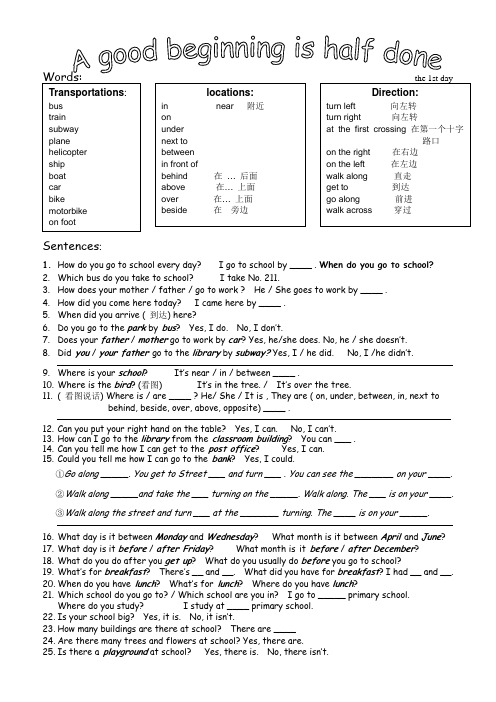
Words:Sentences :1. How do you go to school every day? I go to school by ____ . When do you go to school?2. Which bus do you take to school? I take No. 211.3. How does your mother / father / go to work ? He / She goes to work by ____ .4. How did you come here today? I came here by ____ .5. When did you arrive ( 到达) here?6. Do you go to the park by bus ? Yes, I do. No, I don ’t.7. Does your father / mother go to work by car ? Yes, he/she does. No, he / she doesn ’t. 8.Did you / your father go to the library by subway? Yes, I / he did. No, I /he didn ’t.9. Where is your school ? It ’s near / in / between ____ .10. Where is the bird ? (看图) It ’s in the tree. / It ’s over the tree.11. ( 看图说话) Where is / are ____ ? He/ She / It is , They are ( on, under, between, in, next to behind, beside, over, above, opposite) ____ .12. Can you put your right hand on the table? Yes, I can. No, I can ’t.13. How can I go to the library from the classroom building ? You can ___ . 14. Can you tell me how I can get to the post office ? Yes, I can. 15. Could you tell me how I can go to the bank ? Yes, I could.①Go along _____. You get to Street ___ and turn ___ . You can see the _______ on your ____. ②Walk along _____and take the ___ turning on the _____. Walk along. The ___ is on your ____. ③Walk along the street and turn ___ at the _______ turning. The ____ is on your _____.16. What day is it between Monday and Wednesday ? What month is it between April and June ? 17. What day is it before / after Friday ? What month is it before / after December ? 18. What do you do after you get up ? What do you usually do before you go to school?19. What ’s for breakfast ? There ’s __ and __. What did you have for breakfast ? I had __ and __. 20. When do you have lunch ? Wh at’s for lunch ? Where do you have lunch ?21. Which school do you go to? / Which school are you in? I go to _____ primary school.Where do you study? I study at ____ primary school. 22. Is your school big? Yes, it is. No, it isn ’t.23. How many buildings are there at school? There are ____ 24. Are there many trees and flowers at school? Yes, there are. 25. Is there a playground at school? Yes, there is. No, there isn ’t.。
三一口语三级PPT
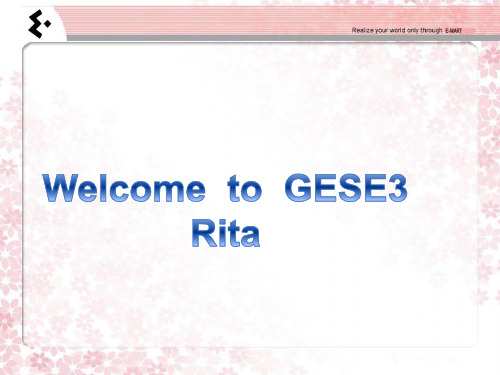
What can we do in the gym? I can play….. I can do sports in the gym.
What can we do in the music room?’ I can sing a song.
What can we do in the classroom? I can have lessons in the classroom.
Your life schedule: When do you …..
get up have a wash put on my clothes eat breakfast watch TV finish my homework clean the table play pingpong clean the floor do my homework play basketball set the table walk my dog play the piano ride a bike play football listen to music play badminton fly a kite skiing play cards play chess play tennis go for a walk go swimming go for a picnic
There are
,,,,,, in my school.
Playground
What can we do on the playground?
We can run on the playground. We can play basketball on the playground.
What we we we
When is your birthday?
三一口语三级课件 My school day

The prepositions of time at ,on , in .
in the morning in the afternoon in the evening on Sunday on Saturday afternoon on Monday morning at at six o’clock at nine o’clock at half past two at half past three
3. They go to school at nine o’clock. They have a break at half past ten. They go to school at nine o’clock. Then they have a break at half past ten.
4. Betty’s brothers finish school at half past three. They go home at four o’clock. Betty’s brothers finish school at half past three. Then they go home at four o’clock. 5. They get up at seven. They have breakfast at eight. They get up at seven. Then they have breakfast at eight.
when where Name school
how many activity
get up have breakfast go to school have classes have lunch play… go home have dinner …
三一口语三级第一课PPT

读出下列日期的英文表达法
1. 3 月12日 March 12th 2. 8月8 日 August 8th
3. 1月5日 January 5th 4. 7月20 日 July 20th 5. 12月1日 December 1st 6. 9月9日 September 9th
7. 4月3日 April 3rd
101
101st one hundred and first
one hundred and one
date日期 10月1日
What’s the date today? It’s Occtober the first.
Copyright 2004-2009 版权所有 盗版必究
What date is it today?
nine ninth 9th nineteen nineteenth 19th
ten tenth 10th twenty
twentieth 20th
1). 1, 2, 3 特殊记。 2). 8去t,9去e 。
3). 5和12换 ve 。 4).整十变y为ie 。
基数词
twenty-one twenty-two twenty-three thirty forty fifty sixty seventy eighty ninety one hundred
• 1 twenty----twentieth • 2 thirty----thirtieth • 3 forty----fortieth • 4 fifty -----fiftieth
• 5 你能写出 sixty seventy eighty ninety 的序数词吗?
Copyright 2004-2009 版权所有 盗版必究
三一口语三级第1-8讲 讲义(完整版)

GESE - Grade 3 Unit 1This is My School.I. Words & Phrases方位: next to(紧挨着), beside(在…旁边), behind(在…后面), in front of(在…前面),under(在…下面), on(在…上面), in(在…里面)学校: classroom building(教学楼), gym(体育馆), playground(操场), basketball court(篮球场), library(图书馆), dining hall(食堂), gate(大门), auditorium(礼堂), dormitory building(宿舍楼), sports field(运动场), swimming pool(游泳池), slide(滑梯), swing(秋千), floor(楼层,地面), the first floor(一楼), the second floor(二楼), the third floor(三楼), teacher’s office(教师办公室), clinic(医务室), washroom(洗手间), computer room(机房), music room(音乐教室), library(图书馆), piano(钢琴), violin(小提琴)描述性: big / large(大), small / little(小), new(新的), old(旧的), beautiful(美丽的), 运动: sport(运动), sports instruments(运动器材), do sports(做运动), table tennis(乒乓球), badminton(羽毛球),其他: introduce(介绍), describe(描述), laptop(笔记本电脑), finger(手指), fist(拳头), calendar(日历),II. Key sentences (“”表示可替换)1. There’s a / an … in my school. / There’re … in my school.2. My school is very … and … (big / small, large, old / new, beautiful)3. We usually do sports in the playground.III. Q&A (“”表示可替换)1. – Is there a ... in your school? – Are there … in your school?– Yes, there is. / No, there isn’t. – Yes, there are. / No, there aren’t.2. – Where is the gym?– The gym / It is next to the playground.3. – What do you do in the gym?– I usually do sports in the gym.4. – Can you introduce the gym in your school?–The gym is very big and beautiful. There’re many sports instruments there. I usually play badminton there.5. – Can you introduce / describe your school?(or “Tell me something about your school.”)–My school is very big and beautiful. There’re a classroom building, a library, a dining hall, a gym, a playground and some basketball courts in my school. I always study and play there. I love my school very much.6. – Which floor is the washroom on? / Where is the washroom?– The washroom is on the first floor.7. – Is the library on the second floor?– Yes, it is. / No, it isn’t.8. – What’s in the library?– There are many books and bookshelves in the library.9. – What do you do in the library?– I read books in the library.10. – How many classroom buildings are there in your school?– There’re three classroom buildings in my school.GESE - Grade 3 Unit 2What Does Your Father Do?I. Words & Phrases职业: teacher, student, doctor, nurse(护士), worker(工人), singer(歌手), dancer(舞蹈演员), artist(艺术家/画家), writer(作家), editor(编辑), engineer(工程师), computer programmer(计算机编程员), hairdresser(理发师), shop assistant(店员), seller (售货员), clerk(职员), accountant(会计), manager(经理), general manager(总经理), president of the board(董事长), soldier(士兵), policeman(警察), lawyer(律师), farmer(农民), cook(厨师), waiter(男服务生), waitress(女服务生), scientist(科学家), driver(司机), pilot(飞行员), tour guide(导游), judge(法官), reporter(记者), housewife(家庭主妇), stewardess(空姐/女乘务员), secretary(秘书)家庭: family member(家庭成员), father, mother, sister(亲姐妹), brother(亲兄/弟), cousin(堂/表兄弟姐妹), grandpa, grandma, uncle(叔/舅/伯/姨父/姑父), aunt(姑/姨/婶/舅妈)场所: office(办公室), hospital(医院), school(学校), factory(工厂), company(公司), shop/store(商店), shopping mall(卖场), super market(超市), barber(理发店), TV station(电视台), newspaper office(报社)II. Q&A (“”表示可替换)1. – How many people are there in your family?– There’re … people in my family.2. – Who are they?– They’re my father, my mother, my… and me.3. – What does your father do? / What’s your father?– My father is an engineer.4. – Where does he work?– He works in an office.5. – Is he a doctor?– Yes, he is. / No, he’s a cook.6. – Does he work in a hospital?– Yes, he is. / No, he isn’t. He works in a restaurant.7. – What do your parents do?– My father is a … My mother is a …8. – Where do they work?– My father works in … My mother works in …9. – Are they very busy?– Yes, they are. / No, they aren’t.10. – How do they go to work?– My father goes to work by car. / My father drives to work.My mother goes to work by subway / by bus / by foot.GESE - Grade 3 Unit 3What’s the date today?I. Words & Phrases月份: January(Jan.), February(Feb.), March(Mar.), April(Apr.), May, June(Jun.), July(Jul.), August(Aug.), September(Sep.), October(Oct.), November(Nov.), December(Dec.)日期: date(日期), Jan. 25(Jan. the twenty-fifth / January the twenty-fifth / the twenty-fifth of January)时间: hour(小时), half an hour(半小时), quarter(15分钟;四分之一), minute(分钟), second(秒), am(上午), pm(下午)II. Q&A (“” 表示可替换)1. – How many seconds are there in a / one minute?–There’re 60 seconds in a minute.2. – How many minutes are there in an hour?– There’re 60 minutes in an hour.3. – How many hours are there in a day?– There’re 24 hours in a day.4. – How many days are there in January?– There’re 31 days in January.5. – How many months are there in a season?– There’re 4 months in a season.6. – How many seasons are there in a year?– There’re 4 seasons in a year.7. – How many months are there in a year?– There’re 12 months in a year.8. – What’s the date today? / What date is it today? (Feb. 14)– It’s February the fourteenth. / It’s the fourteenth of February.9. – What day is today? / What day is it today?– It’s Wednesday.10. – What time is it (now)?– It’s nine o’clock. (9:00)It’s nine twenty-four. (9:24)It’s nine fifteen. / It’s a quarter past nine. (9:15)It’s nine forty-five. / It’s a quarter to ten. (9:45)It’s nine thirty. / It’s half past nine. (9:30)It’s 8:15 am. / It’s 10:45 pm.GESE - Grade 3 Unit 4When do you go to school?I. Words & Phrases短语: wake up(醒来), get up, one’s(某人的), brush one’s teeth(刷牙), wash one’s face(洗脸), have breakfast(吃早饭), go to school(上学), have classes(上课), have lunch(吃午饭), do sports(做运动), go home, have dinner/supper(吃晚饭), do homework(做作业), watch TV(看电视), go to bed(睡觉)学科: subject(学科), Chinese(语文), math(数学), English(英语), dancing lesson(舞蹈课)其他: am(上午), pm(下午), at the weekend(周末) , at school(在学校), after school(放学后), at home(在家), once(一次), twice(两次), three times(三次) II. Q&A (“” 表示可替换;根据实际情况回答)1. – When do you get up in the morning? (when = what time)–I usually get up at six o’clock. Sometimes I get up at seven o’clock, because I have no lesson at the weekend.2. – When do you have breakfast?– I usually have breakfast at seven o’clock. Sometimes I have breakfast at half past seven, because I get up late.3. – What time do you go to school?– I go to school at 7:30.4. – What subjects do you have?– I have math, English, Chinese, PE, music, art and science. I like English best, because I like to speak English.5. – What do you usually do after school / in the evening?– I usually have dinner at six o’clock. Then I do my homework. SometimesI watch TV after diner.6. – Do you have any lessons at the weekend?– Yes, I have English lessons on Saturday and on Sunday I have a math lesson.–No, I don’t have any lessons on Saturday and Sunday, so I can play with my friends. I love my weekend.7. – What do you usually do at the weekend?–I have some lessons on Saturday and on Sunday I usually play basketball with my friends.8. – How often do you play basketball?– I play basketball twice a week.GESE - Grade 3 Unit 6What are they doing?I. Words & Phrases短语: write a letter(写信), do one’s homework, teach English, read books, watch TV, sweep the floor(扫地), clean the bedroom(打扫卧室), water the flowers(浇花), set the table(摆餐桌), listen to music, play soccer(踢足球), ride a bike, ride a horse(骑马), do exercises(锻炼、做操), fly a kite, play chess(下棋), play the violin(拉小提琴), play the piano(弹钢琴), play the drum(打鼓), play baseball(打棒球), play volleyball(打排球), climb the mountain(爬山)特殊的动词ing形式: take(taking), make(making), have(having), ride(riding), write(writing), dance(dancing), hike(hiking), set(setting), jog(jogging), run(running), swim(swimming),其他: hike(远足), fish(钓鱼)II. Q&A (根据实际情况回答)1. – What are you doing?– I’m watering the flowers.2. – What’s he doing?– He’s fishing.3. – What’s she doing?– She’s playing the violin.4. – What are they doing?– They’re playing volleyball.5. – Is he running?– Yes, he is.6. – Is she riding a bike?– No, she’s riding a horse.7. – What is Kate doing?– She’s hiking.8. – Is Mary playing a game?– No, she’s playing a drum.GESE - Grade 3 Unit 7What’s the weather like today?I. Words & Phrases天气:sunny(晴朗的), cloudy(多云的), windy(大风的), rainy(下雨的), raining(正在下雨), snowy(下雪的), snowing(正在下雪), foggy(雾天), stormy(暴风雨/雪天气), lightning(闪电,打闪), hailing(在下冰雹), cold(寒冷的), cool(凉爽的), warm(温暖的), hot(炎热的), wet(潮湿的), dry(干燥的), nice weather(好天气), bad weather(坏天气)其他:have a picnic(野餐), stay home(待在家), in the rain(在雨中), take a walk(散步), in general(总的来说), I’d rather… (我宁愿…)II. Q&A (“” 表示可替换)1. – Nice day, isn’t it? (天气不错,是吧?)Let’s go and have a picnic.– That’s a good idea. (好主意!)2. – What’s the weather like today? / How’s the weather today?– We have bad weather again. It’s cold and windy.3. – Is it snowing?– Yes, it is. / No. It’s raining.4. – What was the weather like yesterday?– It was foggy yesterday.5. – Was it cloudy yesterday?– Yes, it was. / No, it was snowy yesterday.6. – How many seasons are there in a year?– There’re four seasons in a year.7. – What’s the weather like here in spring?– It’s usually cold and dry here in spring.But in general, it’s getting warmer and warmer.8. – Is it cold in Beijing (or “here”) in summer?– No, it’s usually very hot and wet here in summer.9. – What do you like to do in winter?– I like to skate and make a snowman in winter.10. – Do you like to fly a kite in autumn?– Yes I do. / No. I like to … in autumn.11. – When can you make a snowman?– I can make it in winter.12. – When is winter?– Winter is (lasting) from December to February here in Beijing.13. – Do you like to take a walk on rainy days?– Yes, I do. / No. I’d rather stay at home on rainy days.14. – What do you want to do on rainy days?– I want to stay at home with my parents.15. – What do you like to do on sunny days?– I like to go outside and play with my friends.GESE - Grade 3 Unit 8Where were you yesterday morning?I. Words & PhrasesBe动词: was(“be”过去式单数), were(“be”过去式复数.)其他: schedule(日程表); sunny, rainy, snowy(雪天), windy, cloudy, foggy(雾天) 场所: at home(在家), at school(在学校上课), in the garden(在花园), in the playground(在操场), in the hospital(在医院), in the store(在商店), in the bank(在银行), in the park(在公园)II. Q&A (“” 表示可替换)1. – Where were you yesterday?– I was at school (yesterday).2. – Were you at home the day before yesterday?– Yes, I was. / No, I was in the park.3. – Where were the pencils this morning?– The pencils were on the sofa this morning.4. – What was the weather like yesterday?– It was foggy yesterday.5. – Was it cloudy yesterday?– Yes, it was. / No, it was snowy yesterday.6. – What day was it yesterday?– It was Friday (yesterday).7. – Was it Saturday yesterday?– Yes, it was. / No, it was Sunday (yesterday).8. – Wasn’t it Wednesday yesterday?– No. It was Thursday yesterday.9. – What was the date yesterday?– It was Jan. 5 (yesterday).10. – When is your birthday?– My birthday is on February 18.GESE - Grade 3 Unit 9How can I get to the library?I. Words & Phrases问路:turn right(右转), turn left(左转), on the right / on one’s right(在右边), on the left / on one’s left(在左边), walk along / go along / go down(沿...一直走), walk across / go across(穿过...)其他:turning(转弯处), crossing(十字路口), traffic lights(交通灯), zebra crossing(斑马线), street(大街), road(路)地标:library(图书馆), classroom building(教学楼), dining-hall(食堂), gym(体育馆), swimming pool(游泳池), store(商店),department store(百货商场), bookstore(书店), bank(银行), park, cinema(电影院), bus stop(汽车站), hotel / inn(酒店,宾馆), post office(邮局), theatre(剧院), supermarket(超级市场), restaurant(餐馆), subway station(地铁站), railway station(火车站), police station(警察局), university(大学), bakery(面包房)II. Q&A (“” 表示可替换)1. – Excuse me. How can I get to the classroom building?– Walk along this road and turn left at the second turning.2. – Excuse me. Do you know how to get to the theatre?– Of course. Go down this street and take the third crossing on the right.Walk along. The theatre is on your left.3. – Excuse me. Could you tell me the way to the restaurant?– Sure. Go along this road. Get to Street 1 and turn left.Then you can see the restaurant on your right.4. – Excuse me. Do you know the way to the railway station?– Yes. Go straight ahead for about 100 meters.Then you will find it on your left. You won’t miss it.。
三一口语三级
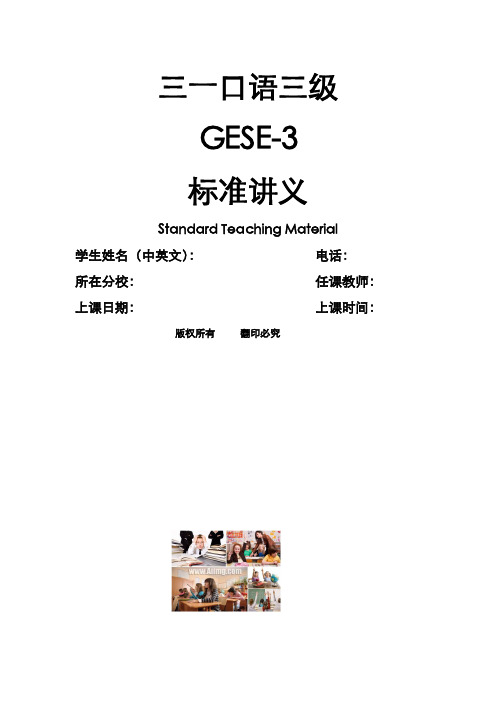
三一口语三级GESE-3标准讲义Standard Teaching Material学生姓名(中英文):电话:所在分校:任课教师:上课日期:上课时间:版权所有翻印必究目录三一口语考试简介 (3)Unit 1 This is my school (5)Unit2 What does your father do? (9)Unit 3 What’s the date today? (12)Unit 4 When do you go to school? (16)Unit 5 ReviewUnit 6 What are they doing? (17)Unit 7 What’s the weather like today? (19)Unit 8 where were you yesterday morning? (23)Unit 9 How can I get to the library? (24)三一口语三级问题库 (25)一、三一口语考试简介伦敦三一学院口语等级考试(GESE -- Graded Examinations in Spoken English)至今已有几十年的历史, 在欧亚、拉美的四、五十个国家和地区开展。
◆此项测试适于6-7岁以上母语为非英语的英语学习者。
◆此项测试共分为四段12个级别。
1-3级为预备段;4-6级为初级段;7-9级为中级段;10-12级为高级段。
◆高一级别的考试内容均涵盖低于该级别的其它级别内容。
◆考试形式为考生与考官进行一对一的交谈。
◆考试成绩评定:A—优秀,B—良好,C—及格,D—不及格。
二、三一口语三级考试涉及到的词汇:●有关工作的●有关当地场所的●有关学习场所的●有关家庭生活的●有关天气的●有关业余生活的●有关时间和日期的三、三一口语三级考试的所涉及的语言功能:●描述日常活动,事情和天气●表示时间和日期●表示“能”与“不能”,can & can't●简单地指示方向和地点●描述真实人物或图片中人物正在进行的活动●表述过去的状态●表示动态的介词:from, to, up, down, along, across●表示地点方位的介词:near, in front of, behind, opposite ●be 动词的过去式- was, were注意:从三级开始,要求考生能主动就所讨论的话题反问考官。
三一口语三级PPT上课讲义
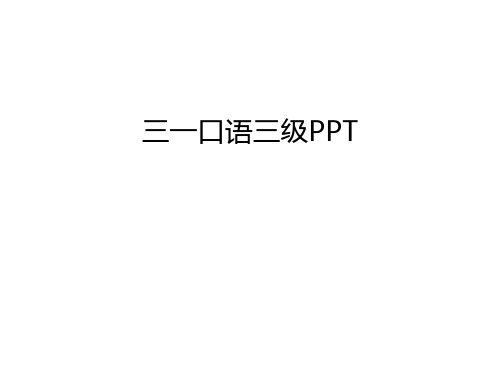
Can we talk in the library? no, we can’t.
Can we run on the playground? Yes, we can .
How many buildings are there in your school?
三一口语三级PPT
I s your school
Yes, it is. No , it isn’t.
big?
There is …… in my school.
There are ,,,,,, in my school.
Playground
What can we do on the playground?
• I watch TV at 8:30.
When do you go to bed? I go to bed at 9.
How many lessons do you have in your school?
ArtΒιβλιοθήκη EnglishLearn how to draw a picture
recite English words
Hello! I am going to my school。
What time is it ?
时间表示法: It ….. O’clock. It is ….. Past……. It is ….. To…. Half quarter
When do you get up?
I get up at 7 o’clock.
What can we do in the gym? I can play….. I can do sports in the gym.
新概念英语三第一课课件

cat-like=like cat
dog-like
mother-like
例:大熊猫是大型的体型像猫的动物,产业中国 。
Pandas are large, cat-like animals which are found in China.
spot v. 看出,发现 =see, pick out, recognize 强调结果 例:The prisoner was easily spotted in the crowed since he wore handcuffs.
unsettled.
Exercises:
1. The fact ____ she works hard is well known to us all. A. that B. what C. why D. which
2. The fact ____ he was successful proves his ability. A. that B. what C. which D. why
经过一些调查,我已经确定他们是伪娘。 After some investigation, I have confirmed that they are the so-called“girly-man”.
corner n. 角落 around the corner 即将到来 例:A storm is around the corner for the sky is dark and gray. v. corner sth/sb 使走投无路
The experts from London zoo began to hunt(v.) for a puma. the hunt for the puma proved
16410_新概念英语三册第一课课件

Content of the first lesso…
This lesson is the first lesson in the third volume, mainly focusing on daily life scenarios, including greetings, introductions, shopping, and other topics.
15
Key sentence analysis and translation
Key sentence 1: He had a very unimportant experience the week before
01
02
He experienced a very unpleasant thing the week before.
பைடு நூலகம்
2024/1/25
06
He didn't want to attend that dinner party.
16
04
Sorting and application of grammar knowledge points
2024/1/25
CHAPTER
17
Review of key grammar knowledge points in this lesson
Key sentence 2: He had been invited to a dinner party
03
04
He was invited to attend a dinner party.
三一口语课件
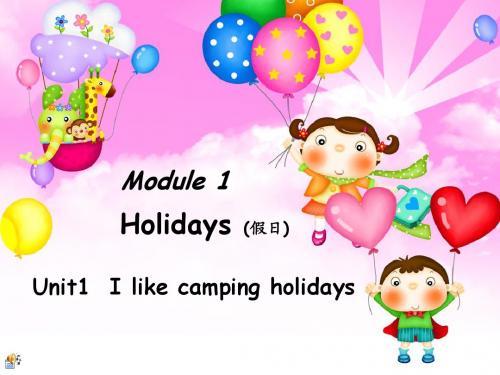
五. Work in pairs .
Ask and answer.
I really like snow skiing. What about you? I don’t like hiking. It is so tiring. What about you?
Page 10
Work in pairs
1.What kind of holiday do you like? 2.What do you like doing on holiday? 3.What kind of holiday does your friend like? 4.What does your friend like doing oread
Tony: Hi,Joe!What are you doing? Joe: Hi,Tony!I'm uploading some photos to my blog. Tony: Wow!Great pictures!Was it a good camping holidays? Joe: Yes,you know I like camping. Tony: Yes.But I don't like camping at all. Joe: What holidays do you like? Tony: I like beach holidays.I like swimming in the sea,and playing football on the sand
Page 2
dive n.潜水 跳水 v.跳水 俯冲
Page 3
一.Discourse text
1.I like sightseeing holidays. 2.What do you do on a hiking holidays? B
- 1、下载文档前请自行甄别文档内容的完整性,平台不提供额外的编辑、内容补充、找答案等附加服务。
- 2、"仅部分预览"的文档,不可在线预览部分如存在完整性等问题,可反馈申请退款(可完整预览的文档不适用该条件!)。
- 3、如文档侵犯您的权益,请联系客服反馈,我们会尽快为您处理(人工客服工作时间:9:00-18:30)。
• 5 你能写出 sixty seventy eighty ninety 的序数词吗?
Copyright 2004-2009 版权所有 盗版必究
Einstein
His birthday is
March 14th.
( 1879.3.14-1955.4.)
Copyright 2004-2009 版权所有 盗版必究
• Lu Xun
•His birthday is Sept.25th
(1881.9.25-1936.10.19)
Copyright 2004-2009 版权所有 盗版必究
• It’s November the sixteenth.
11月16日
What’s the date today?
It’s the eighteenth of November
11月18日
What date is it today? =What’s the date today? It’s November the first. =It’s the first of November.
five fifth
5th fifteen
fifteenth 15th
six sixth
6th sixteen
sixteenth 16th
seven seventh 7th seventeen seventeenth 17th
eight eighth 8th eighteen eighteenth 18th
序数词 “二十以上末位序”
twenty-first twenty-second twenty-third thirtieth fortieth fiftieth sixtieth seventieth eightieth ninetieth
one hundredth
21st 22nd 23rd 30th 40th 50th 60th 70th 80th 90th 100th
你对了吗?
• 1. Sixty----sixtieth • 2. seventy---seventieth • 3.eighty----eightieth • 4,ninety----ninetieth
Copyright 2004-2009 版权所有 盗版必究
几十几的序数词,十位数不变, 个位数变成序数词。
基数词
序数词
基数词
序数词
one first
1st eleven
eleventh 11th
two second 2nd twelve
twelfth
12th
three third
3rd thirteen
thirteenth 13th
four fourth 4th fourteen fourteenth 14th
It’s on
Sept.10th.
It’s on June 1st .
It’s on Dec.25th .
It’s on March 8th .
It’s on August 1st .
8. 11月2日November 2nd
9. 2月14日 February 14th 10. 5月30 日 May 30th
11. 6月23日 June 23rd 12. 10月21日October 21st
下一页
When is your birthday?
My birthday is on Nov_em__பைடு நூலகம்e_r_22_n_d .
nine ninth 9th nineteen nineteenth 19th
ten tenth 10th twenty
twentieth 20th
1). 1, 2, 3 特殊记。 2). 8去t,9去e 。
3). 5和12换 ve 。 4).整十变y为ie 。
基数词
twenty-one twenty-two twenty-three thirty forty fifty sixty seventy eighty ninety one hundred
11月1日
读出下列日期的英文表达法
1. 3 月12日 March 12th 2. 8月8 日 August 8th
3. 1月5日 January 5th 4. 7月20 日 July 20th 5. 12月1日 December 1st 6. 9月9日 September 9th
7. 4月3日 April 3rd
• 1. twenty-one 21----twenty-first 21st • 2.thirty-two 32-----thirty-second 32nd • 3.ninety-nine 99----ninety-ninth 99th • 4 .请写出66 83 48 55的序数词。
Copyright 2004-2009 版权所有 盗版必究
三一口语三级第一课PPT
1-12月
Copyright 2004-2009 版权所有 盗版必究
表示次序的数词叫序数词,是由 基数词变化而来的。
• 1 one -----first • 2 two------second • 3 three----third
• 4 其余的序数词是由基数词后 加-th 变化而来。
101
101st one hundred and first
one hundred and one
date日期 10月1日
What’s the date today? It’s Occtober the first.
Copyright 2004-2009 版权所有 盗版必究
What date is it today?
Copyright 2004-2009 版权所有 盗版必究
几个特殊变化的序数词
• 1 five----fifth • 2 twelve----twelfth • 3 eight----eighth • 4 nine----ninth
Copyright 2004-2009 版权所有 盗版必究
整十的序数词把 y 变成 i加-eth
